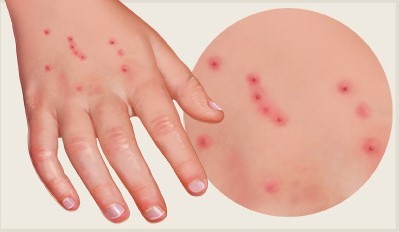There is no happier feeling than being one of the newest parents in town. Even if it’s your second or third baby, it is a joyful experience and all you want to do is protect them. The thought of bed bugs biting your baby is mind-numbingly scary.
All 50 states in the USA have bed bugs thus, waking up with bed bug bites on your baby is a possibility. The good news is that you can successfully protect your little bundle of joy from these vampiric critters. Here are some tips on how to identify and deal with bed bugs to protect your baby.
Table of Contents
Signs of Bed Bugs on Your Baby’s Crib
Bed bugs in a baby’s crib are any parent’s worst nightmare. The thought of these bugs biting your child is enough to cause give you sleepless nights. One of the best ways to stay ahead of any possible infestation is knowing how to check for bed bugs. Here are some common signs of bed bugs that will help you identify them:
Bed bug bites – Differentiating bed bug bites from other insect bites is not as easy as you would think. Bed bugs bites are usually small, red spots with a dark spot in the middle. They usually appear in clusters especially, in exposed areas of the skin like the face, neck, hand and legs of your baby. If your baby starts scratching, you may find blood stains on the sheets.
Bed bug droppings– Bed bug droppings consist of partially digested blood. Look for tiny, dark spots around your baby’s bed sheet or cracks and crevices on the crib.
Blood stains and sheets and mattress – Blood stains on your baby’s bed sheets may indicate presence of a bed bug infestation. The stains will often be either red or rusty red. The rusty red colors usually accompany bed bug droppings due to partial digestion. If the baby scratches bed bug bites or inadvertently crushes engorged bed bugs, you will spot red blood stains on bed sheets.
Bed bug exoskeletons – to reach adulthood, bed bug nymphs shed exoskeletons five times during their life cycle. With the help of a reliable UV flashlight you will notice bed bug exoskeleton’s in infested spaces.
Getting Rid of Bed Bugs in Your Baby’s Room
Bed bugs are masters of disguise and hard to kill so much that history records them to have survived dinosaur mass extinction. It will take some hard work and diligence but you can get rid of them. In the mean-time, here are some common ways to get rid of bed bugs and keep your baby safe:
- Heat treatment is one of the best remedies for bed bugs. Wash all washable items belonging to your baby in hot water and dry them in a hot drier.
- Bed bug eggs are extremely hard to get rid of. Although it does not offer any guarantee of success, you should scrub your furniture to get rid of bed bugs eggs.
- Vacuum your baby’s room and the rest of your home. If bed bugs are in your baby’s room, they have likely spread through the rest of the house.
- Pick an effective bed bug treatment protocol. Most people go for pesticides to deal with bed bugs, but it’s unsafe to spray chemicals near our babies. Also, pesticides can be ineffective because bed bugs develop resistance to them.
Pro Tips: You can create at first a safe zone in the bed to protect your baby from bed bugs. The easiest is to use heat treatments; Steam the bed frame and wash the bedding at a high temperature. Then, to avoid the re-infestation of this area, you can use traps under the bed legs. Traps can stop bedbugs because they can only crawl and do not jump.
Can Bed Bugs Harm Your Baby?
Unlike most pests, bed bugs do not transmit diseases through their bites. That said, that is the only good news when it comes to these pesky critters. They can cause a lot of harm and turmoil for your baby.
Bed bug bites are itchy and can cause the baby to lose sleep which may in turn, trigger serious mental illnesses. Also, in instances where the baby excessively scratches skin, it raises the chance of getting opportunistic or secondary skin infections. Seek immediate medical attention in case of the baby having severe allergic reactions to bed bug bites.
Treating Bed Bug Bites on Your Baby
Treatment of bed bug bites when dealing with children varies based on their ages and brutality of the bite. An infant’s skin is still developing and may have an adverse reaction to creams that usually work on adults. When picking a treatment for bed bug bites on your baby, you need to ensure that it is safe for them.
Before applying any ointments on your baby, it is wise to wash the bed bug bites with warm water and soap. Once the bite area is clean and dry, you can start the treatment protocol. Here are some things that you can try:
- Apply mild antiseptic cream such as corticosteroid. You can find antiseptic creams at your nearest pharmacy. You must tell the pharmacist how old your baby is, the severity of the bites, and if they have any allergic reactions to specific ointments.
- Apply an ice pack on the bites at well thought out intervals.
- Apply home remedies such as baking soda on the baby.
Home Remedies to Treat Bed Bites on Your Baby
Considering that bed bug bites rarely cause severe medical emergencies, you can manage their symptoms using home remedies. Here are some home remedies that can help your baby find relief from bed bug bites:
- Baking Soda – Apply baking soda paste on your baby’s skin to soothe skin and to alleviate itching. To make and use this paste you;
- Add a little water to baking powder
- Mix it until it forms thick paste
- Apply directly onto bed bug bites on your baby
- Sandal paste – Sandal has a cooling effect on the skin that offers the much needed relief for your baby. It would be best to mix the sandal paste with a dash of turmeric that acts as an antiseptic.
- Ice packs – Ice packs offer a short term relief to itching skin owing to its cooling effect.
- Neem leaves – The anti-inflammatory properties of neem leaves alleviate skin inflammation due to bed bug bites. Crush the leaves to form a paste and apply evenly over bed bug bites on your baby’s skin. You need to apply the pest as often as it takes to heal the bites.
When to See a Doctor about Bed Bug Bites On Your Baby
Bed bug bites do not transmit diseases but there are some circumstances that call for professional medical consultation. For instance, extreme scratching as a result of over-itching may lead to swollen scars on your baby’s skin. It is advisable to see a doctor in the following scenarios:
- The itchiness does not subside and it causes the baby to cry continuously
- The bed bug bites become worse and develop into painful blisters
- There is a secondary skin infection that fails to respond to over the counter creams or lotions
- If the baby develops a fever
- If the toddler develops respiratory problems due to allergic reactions
Final Thoughts
As a parent, I am sure you love your toddlers so much that you wouldn’t want bed bugs to ruin their joy. Unfortunately, bed bug statistics show that these vampiric are bigger problem than ever before. You need to take a preemptive approach in your fight against bed bugs by:
- Employ effective bed bug monitoring tools all around your home
- Wash all washable items in your baby’s nursery in hot water regularly
- Remove rugs and other items that offer potential hiding spots for bed bugs in the nursery
- Consider rubbing safe bed bug repellent essential oils on the baby
FAQs
What do bed bites look like on a baby?
They are tiny, red bumps with darkened middle spots and they usually occur in clusters on the exposed skin of your baby.
Can a baby get sick from bed bug bites?
No. Bed bug bites do not transmit disease. However, your baby may get a secondary skin infection from excessive scratching of the bed bug bites.
Does breast milk help alleviate the effects of bed bug bites?
No. There are no existing studies to prove this.

